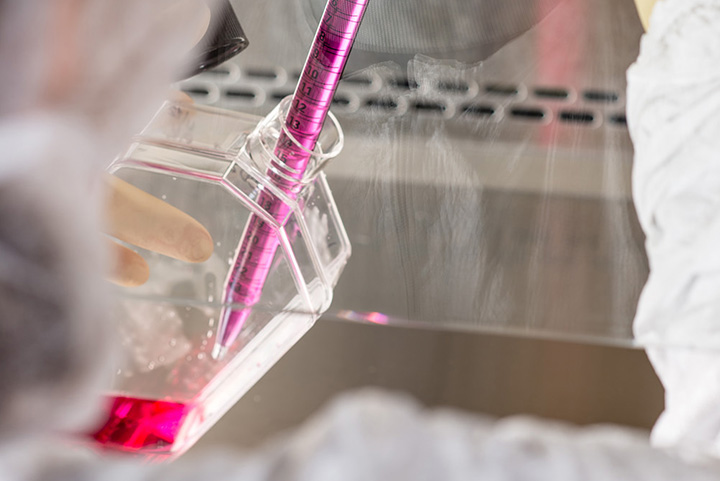A Year in Review: 2022 in Research

Whether they are working with test tubes, big data, or directly with patients—sometimes all three—pancreatic cancer discovery scientists and physician–scientists have one goal: to improve outcomes for patients.
Year-end is a great time for reflecting on those findings that could potentially make pancreatic cancer a more treatable disease, no matter the stage at which a patient is diagnosed. As we do every year, Let’s Win is highlighting a few of the remarkable research breakthroughs of the past 365 days. These breakthroughs are the result of years of diligent science and a commitment to excellence.
Surveillance Works
The majority of high-risk patients diagnosed with pancreatic cancer while enrolled in a multidisciplinary surveillance program are found to have stage I disease. Not only are these patients candidates for surgery—the only potential cure for the disease—but most are long-term survivors. The study found that more than 70 percent of patients were still alive five years later.
The research, dubbed The Cancer of the Pancreas Screening-5 (CAPS5) Study, which was published in June 2022 in the Journal of Clinical Oncology, found that high-risk patients diagnosed with pancreatic cancer while enrolled in the CAPS5 surveillance program had a median survival of 9.8 years. The ongoing, multicenter CAPS5 study takes place in large medical centers. In the future, researchers hope the data will be compelling enough for smaller healthcare systems to adopt high-risk pancreatic cancer screening efforts.
Stopping Pancreatic Cancer in Its Tracks
There is significant ongoing research in using vaccines against pancreatic cancer, one of the most deadly of malignancies. A new pancreatic cancer prevention trial dubbed Mutant KRAS-Targeted Long Peptide Vaccine for Patients at High Risk of Developing Pancreatic Cancer began at The Sidney Kimmel Comprehensive Cancer Center at Johns Hopkins (Baltimore, Maryland). It is designed to see if a peptide vaccine targeted to recognize the KRAS (Kirsten Rat Sarcoma) mutation in pancreatic cancer can stop the disease from ever gaining a foothold among those at greatest risk.
Improving Early Detection
The Lustgarten Foundation awarded grants to Alison Klein, Ph.D., M.H.S., Co-Leader, Cancer Prevention and Control Program (CPC) and Professor of Oncology at Johns Hopkins University School of Medicine, for her study Identifying High-Risk Pancreatic Cancer Genes using Long Read Sequencing and to Laura Wood, M.D., Ph.D., Associate Professor of Pathology at Johns Hopkins University School of Medicine, for her study 3D Analysis of Human Pancreatic Tissue to Improve Early Detection of Pancreatic Cancer. The processes and events that drive pancreatic cancer risk and early development of tumors are not well understood. These projects will use cutting-edge approaches to better understand the genetics of pancreatic cancer risk and the earliest events controlling the transition from a benign lesion to a tumor. If successful, this work could help to improve detection methodologies and identify approaches to stop pancreatic cancer at the earliest stages of the disease.
Personalized mRNA Vaccine
A new vaccine developed using the same technology as the Pfizer-BioNTech COVID vaccine is raising some intriguing possibilities in the treatment of pancreatic cancer. In an initial trial, half of the pancreatic cancer patients receiving the vaccine remained cancer-free 18 months later.
The treatment was developed by surgeon–scientist Vinod Balachandran, M.D., of the Memorial Sloan Kettering Cancer Center in New York City, working together with the biopharmaceutical firm BioNTech and the biotechnology company Genentech. The results of the trial were presented at the American Society of Clinical Oncology 2022 conference. In this case, each pancreatic cancer vaccine is personalized for the individual patient and contains neoantigens from their tumors most likely to stimulate T cells. In eight of 16 patients studied, the vaccines activated T cells that recognized the patient’s own pancreatic cancer. Those patients also showed delayed recurrence of their pancreatic cancer, suggesting the T cells activated by the vaccines may be having the desired effect of keeping the pancreatic cancer in check. This trial is the first to use mRNA to treat pancreatic cancer.
PRINCE Trial Shows Promise
An initial clinical research study by the Parker Institute for Cancer Immunotherapy (PICI), called the PRINCE trial, suggested a combination of chemotherapy (gemcitabine and nab-paclitaxel), an immune checkpoint inhibitor (nivolumab), and a CD40 agonist (APX005M)—a cell surface molecule—could shrink tumors in pancreatic ductal adenocarcinoma (PDAC). Based on early results, scientists expanded the trial to a larger group, which did not show the same promising results. Despite the setback, researchers discovered a silver lining: using state-of-the-art clinical data analysis tools, scientists identified distinct biosignatures associated with longer survival in the treated patients. These biosignatures could be helpful in predicting which future patients may benefit from this treatment.
Exercise Improves Treatment Response
Now a new study from NYU Grossman School of Medicine researchers shows that exercise may improve the responsiveness of pancreatic cancer to treatment. In the study, published in the journal Cancer Cell, they showed mice with pancreatic cancer that exercised regularly on a mini-treadmill had less cancer growth than those that did not. The researchers showed that these mice actually had a more robust anti-tumor response and an improved sensitivity to immunotherapy treatment. The volume of cancer-killing CD8 T cells increased by up to 175 percent in the tumors of exercised mice. The findings show, for the first time, how aerobic exercise globally affects the immune microenvironment within pancreatic tumors. Researchers also learned more about the role of IL-15 signaling in pancreatic cancer and how its activation could potentially be an important and effective approach to treatment. The study showed that both exercise AND the IL-15 therapy made an immune checkpoint inhibitor—a drug that blocks a protein called PD-1—more effective. The mice treated with IL-15 therapy and PD-1 blockade together had even more health benefits compared to the exercising mice.
The Power of Social Media
On the home front, Let’s Win’s ongoing Twitter-based patient education program #PancChat continues to grow. The past year brought programs not only on research-focused topics such as pancreatic cancer genetics and immunotherapy but also topics that help patients better manage their disease or navigate the clinical trial landscape. The power of social media was confirmed by a study of #PancChat published in the Journal of Medical Internet Research. Allyson J. Ocean, M.D., Chair, Scientific Advisory Board, and Co-Founder of Let’s Win Pancreatic Cancer said “The findings of this study offer valuable insights for all stakeholder groups involved in the fight against pancreatic cancer, not least healthcare professionals. For one, they suggest healthcare professionals can harness Twitter to disseminate information to and receive feedback from a substantial community of patients and other relevant stakeholders.” On behalf of the Let’s Win team, we wish you and those you love a new year filled with peace and hope






